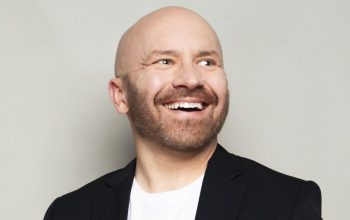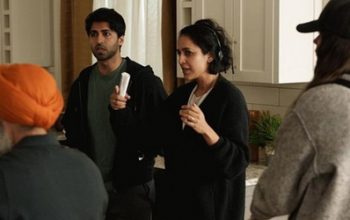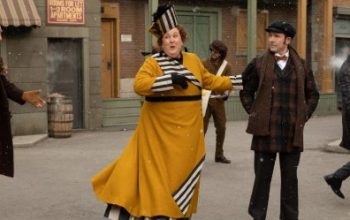With Monday’s Plan B, the series reaches its halfway point, and in the second part of my interview with series stars Patrick J. Adams and Karine Vanasse, they talk about the slippery slope of trying to repair a relationship by manipulating the timeline.
Adams says it was a continuous discussion about the choices that Phil makes – and doesn’t make. “We talked a lot on set [about] how this show lasts six episodes, but what could Phil have done right from the beginning that would not send us down this path of terror and destruction and making things worse,” he shares.
“Rather than go back in time and try to manipulate events and set things up so that now I’m the perfect husband, he could have just listened to her. He has a few moments where he says, ‘Hey, I have been spinning out and I’m sorry, and I’m here and how can I help and how can I listen to you and what do you need,’ but they’re in the context of time travel, so it doesn’t really work.”
“Instead he’s [thinking], ‘I’ve got to get things done. I’ve just got to get it right. I’ve got to get more money for us. That will make us happy. I’ve got to make it possible for us to have a family together one day. I just need to keep putting the building blocks on top of each other,’ instead of just stopping and listening to what my partner has to say and what concerns her and how I could address those concerns.”
“There’d be a much simpler way to deal with this rather than going back in time. But I guess Phil’s not interested in simple. There’s so much presumption in that and you just end up going so far in a direction rather than just stopping and listening and connecting to your partner, which Philip just cannot do until it’s too late in this circumstance.”
Vanasse adds that Phil’s POV, in any timeline, is his own, and until he asks the right questions, he will never fully grasp who Evelyn is, regardless of the circumstances that he’s changing around her. “What’s interesting is that even if he thinks that he now has the advantage of knowing more, it’s never enough to really do it his way only. So even when you think that this time you have all the information, you have all the cards in your hands, you’re [still] not the other person,” she explains.
“Sometimes you just have to listen. It’s not about knowing what you bring to the table and how you can rearrange the reality of things. It’s about being aware that the other person is someone different than you and it’s never going to be entirely clear what’s happening for them if you don’t listen.”
“It is not perfect on Evelyn’s side, either. She’s assuming that he’ll know what’s happening. You have to say something. You can’t pretend that he’ll just see everything through you because you are experiencing it. Don’t expect the other to just know everything about you.”
“You’re also trying to fix everything without the other person knowing what’s happening, as if you had to make it all perfect and present it [like you already had it all figured out] without any vulnerability. It’s okay to learn from the other person and adjust and take it from that vulnerable standing point of just saying, ‘I don’t know. Tell me,’ Now I’m receiving it with an open heart.”
Adams acknowledges that Phil’s a complicated character, and the audience will have to bear witness to some questionable choices. “One of the challenges coming into it, that I related to it, is his instinct to want to fix things. I think I’m a good problem solver [who looks at ] logistical steps to make your situation better. Sometimes that’s a useful tool, but most of the time [it’s not],” he says.
“I wanted to play Phil and make him as relatable as possible for as long as possible. How far can I get the ball down the field with this guy? Some of my favorite things that I watch I judge [a character’s behavior], saying, ‘Wow, ooh, that was a mistake, but I understand why the mistake was made and it had some good intention behind it.’”
“And to me that’s what makes stories compelling is that we can watch people do pretty much anything, especially now in the landscape of film and television. We have such profoundly good storytellers that they can really make us feel for people doing some unbelievably despicable things.”
“We start to understand the context of what would make a human being do something like this. And so for me, that was the goal and the challenge was just try and see it from his perspective.”
“Not to forgive him or let him get away with it, but to just go along for the ride. And imagine if you were put in this situation and you’re faced with losing someone you love very much, or your job’s in trouble or anything else in your life is in peril, well, maybe you would try and take advantage of this sort of shortcut. And then when it started going wrong and you had this shortcut at your disposal, you go back to it again.”
“You start doubling down on the secrets and the lies. And I think that’s what happens and I hope people who tune in see that this isn’t just a show about time travel, but it’s really about exploring that very real and human thing that we do once we start deceiving and lying.”
“It just snowballs and you cannot catch up and you keep trying to make it right with one more lie and it just spins out of control. So that was the challenge for me, to try and make that relatable and have people feel like they can see how they might in their own lives go down that path and hopefully choose not to.”
Plan B airs Mondays at 9 p.m. ET (9:30 NT) on CBC and CBC Gem, where you can also catch up on the series premiere. If you missed it, our series preview and first interview are here.
Photos Courtesy of CBC.




